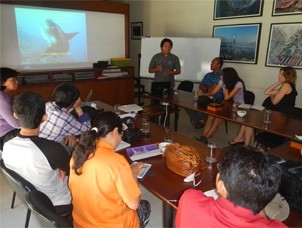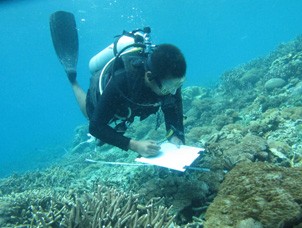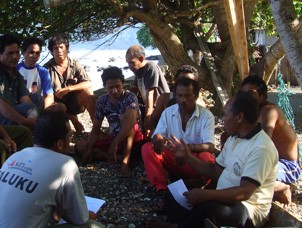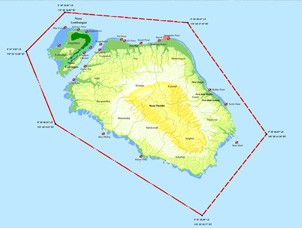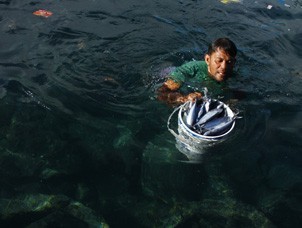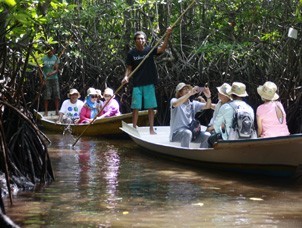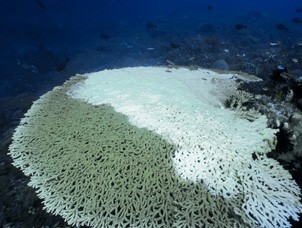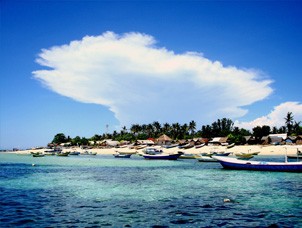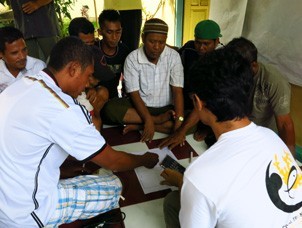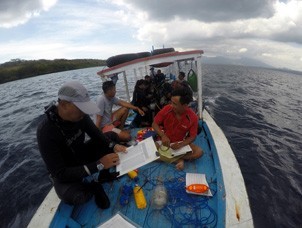Managing for Climate Change
Managing for Climate Change
Climate change will dramatically affect coastal communities and ecosystems in the Coral Triangle. Changes in precipitation patterns will affect agriculture. Changes in ocean circulation and ocean chemistry will affect marine productivity and the distribution of marine life. Severe storms and coastal flooding will displace communities, damage infrastructure, and affect livelihoods.
In marine and coastal ecosystems, climate change can lead to:
-
Changes in water temperature and oceanic circulation patterns, which can provoke far-reaching disruptions throughout the marine food web.
-
Changes in water temperature and oceanic circulation patterns, which can provoke far-reaching disruptions throughout the marine food web.
-
Sea level rise, which can lead to saltwater flowing into estuarine and freshwater habitats; this which can have a negative effect on species and habitats that are sensitive to salinity shifts. Coastlines, too, may erode and be lost in some areas.
-
Coral reef bleaching and associated die-off, natural phenomena that are exacerbated by climate change. A lot of critical marine habitat (such as coral reefs, sea grass beds, and mangroves) can only exist within a certain temperature range and under particular conditions. Climate change can have a devastating negative effect on these conditions, leading to habitat loss.
-
Ocean acidification, is caused by increased levels of carbon dioxide (CO2) in the oceans. Acidification can reduce the ability of corals, crustaceans, shellfish, and plankton to form shells and skeletons, critically threatening their survival, with far-reaching negative consequences for all marine life.
These climate change stressors can have a compound effect on ecosystems already weakened by other anthropocentric activities, such as habitat destruction (through destructive fishing methods or habitat removal), pollution, and the over-exploitation of marine resources and fisheries. Together, these compound threats may be overwhelming for a system. Effective management in these circumstances requires an integrated understanding and approach.
Our training helps practitioners develop an understanding of the way climate change influences marine environments. The training develops the skills necessary to perform vulnerability assessments and introduces approaches that may confer resilience for marine and coastal habitats in the face of climate change. Main areas of consideration are:
-
the protection of species and habitats with crucial ecosystem roles, or those of special conservation concern;
-
the protection of species and habitats with crucial ecosystem roles, or those of special conservation concern;
-
the protection of potential carbon sinks;
-
the protection of ecological linkages and connectivity pathways for a wide range of species;
-
the protection of the full range of biodiversity present in the target biogeographic area.
COURSES AVAILABLE
Planning for climate adaptation will require a planning team committed to the process and team members with the authority, specialized expertise, and resources to take action. By participating in this training, participants learn to effectively integrate planned climate change adaptations into existing plans, programs, policies, ongoing community development, and coastal management efforts.
Objectives
-
To convey climate change and threats to coastal communities.
-
To convey climate change and threats to coastal communities.
-
To enable participants to identify potential impacts of climate change for coastal communities.
-
To teach skills in conducting vulnerability assessments.
-
To teach skills in developing climate change adaptation plans and locally relevant early action plans.
Intended Audience
This training is for:
-
Coastal area / MPA managers
-
Coastal area / MPA managers
-
Community representatives
-
Multi-sector district government department leads
-
Planners
Minimum Requirements
-
High school degree or equivalent
-
High school degree or equivalent
-
Experience working in coastal areas
Language
This training can be given in Bahasa Indonesia and/ or English.
Duration
Four full days
Other Courses



